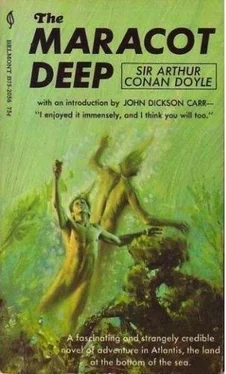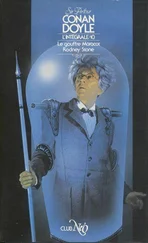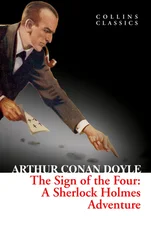Arthur Doyle - The Maracot Deep
Здесь есть возможность читать онлайн «Arthur Doyle - The Maracot Deep» весь текст электронной книги совершенно бесплатно (целиком полную версию без сокращений). В некоторых случаях можно слушать аудио, скачать через торрент в формате fb2 и присутствует краткое содержание. Жанр: Фантастика и фэнтези, на английском языке. Описание произведения, (предисловие) а так же отзывы посетителей доступны на портале библиотеки ЛибКат.
- Название:The Maracot Deep
- Автор:
- Жанр:
- Год:неизвестен
- ISBN:нет данных
- Рейтинг книги:4 / 5. Голосов: 1
-
Избранное:Добавить в избранное
- Отзывы:
-
Ваша оценка:
- 80
- 1
- 2
- 3
- 4
- 5
The Maracot Deep: краткое содержание, описание и аннотация
Предлагаем к чтению аннотацию, описание, краткое содержание или предисловие (зависит от того, что написал сам автор книги «The Maracot Deep»). Если вы не нашли необходимую информацию о книге — напишите в комментариях, мы постараемся отыскать её.
The Maracot Deep — читать онлайн бесплатно полную книгу (весь текст) целиком
Ниже представлен текст книги, разбитый по страницам. Система сохранения места последней прочитанной страницы, позволяет с удобством читать онлайн бесплатно книгу «The Maracot Deep», без необходимости каждый раз заново искать на чём Вы остановились. Поставьте закладку, и сможете в любой момент перейти на страницу, на которой закончили чтение.
Интервал:
Закладка:
There was one consideration which was very quickly forced upon us by our examination, on various occasions, of as much of this building as was open to our inspection. This was that the exposure to the sea had been foreseen and the protection against the inrush of the water had been prepared long before the land sank beneath the waves. Of course, it stood to reason, and needed no proof, that such precautions could not have been taken after the event, but we were witnesses now of the signs that the whole great building had from the first been constructed with the one idea of being an enduring ark of refuge. The huge retorts and vats in which the air, the food, the distilled water, and the other necessary products were made were all built into the walls, and were evidently integral parts of the original construction. So, too, with the exit chambers, the silica works where the vitrine bells were constructed, and the huge pumps which controlled the water. Every one of these things had been prepared by the skill and the foresight of that wonderful far-away people who seemed, from what we could learn, to have thrown out one arm to Central America and one to Egypt, and so left traces of themselves even upon this earth when their own land went down into the Atlantic. As to these, their descendants, we judged that they had probably degenerated, as was but natural, and that at the most they had been stagnant and only preserved some of the science and knowledge of their ancestors without having the energy to add to it. They possessed wonderful powers and yet seemed to us to be strangely wanting in initiative, and had added nothing to that wonderful legacy which they had inherited. I am sure that Maracot, using this knowledge, would very soon have attained greater results. As to Scanlan, with his quick brain and mechanical skill, he was continually putting in touches which probably seemed as remarkable to them as their powers to us. He had a beloved mouth-organ in his coat-pocket when we made our descent, and his use of this was a perpetual joy to our companions, who sat around in entranced groups, as we might listen to a Mozart, while he handed out to them the crooning coon songs of his native land.
I have said that the whole building was not open to our inspection, and I might give a little further detail upon that subject. There was one well-worn corridor down which we saw folk continually passing, but which was always avoided by our guides in our excursions. As was natural our curiosity was aroused, and we determined one evening that we would take a chance and do a little exploring upon our own account. We slipped out of our room, therefore, and made our way to the unknown quarter at a time when few people were about.
The passage led us to a high arched door, which appeared to be made of solid gold. When we pushed it open we found ourselves in a huge room, forming a square of not less than two hundred feet. All around, the walls were painted with vivid colours and adorned with extraordinary pictures and statues of grotesque creatures with enormous head-dresses, like the full dress regalia of our American Indians. At the end of this great hall there was one huge seated figure, the legs crossed like a Buddha, but with none of the benignity of aspect which is seen on the Buddha’s placid features. On the contrary, this was a creature of Wrath, open-mouthed and fierce-eyed, the latter being red, and their effect exaggerated by two electric lights which shone through them. On his lap was a great oven, which we observed, as we approached it, to be filled with ashes.
“Moloch!” said Maracot. “Moloch or Baal — the old god of the Phoenician races.”
“Good heavens!” I cried, with recollections of old Carthage before me. “Don’t tell me that these gentle folk could go in for human sacrifice.”
“Look it here, Bo!” said Scanlan, anxiously. “I hope they keep it in the family, anyhow. We don’t want them to pull no such dope on us.”
“No, I guess they have learned their lesson,” said I. “It’s misfortune that teaches folk to have pity for others.”
“That’s right,” Maracot remarked, poking about among the ashes, “it is the old hereditary god, but it is surely a gentler cult. These are burned loaves and the like. But perhaps there was a time — ’
But our speculations were interrupted by a stern voice at our elbow, and we found several men in yellow garments and high hats, who were clearly the priests of the Temple. From the expression on their faces I should judge that we were very near to being the last victims to Baal, and one of them had actually drawn a knife from his girdle. With fierce gestures and cries they drove us roughly out of their sacred shrine.
“By gosh!” cried Scanlan, “I’ll sock that duck if he keeps crowding me! Look it here, you Bindlestiff, keep your hands off my coat.”
For a moment I feared that we should have had what Scanlan called a “rough house” within the sacred precincts. However, we got the angry mechanic away without blows and regained the shelter of our room, but we could tell from the demeanour of Manda and others of our friends that our escapade was known and resented.
But there was another shrine which was freely shown to us and which had a very unexpected result, for it opened up a slow and imperfect method of communication between our companions and ourselves. This was a room in the lower quarter of the Temple, with no decorations or distinction save that at one end there stood a statue of ivory yellow with age, representing a woman holding a spear, with an owl perched upon her shoulder. A very old man was the guardian of the room, and in spite of his age it was clear to us that he was of a very different race, and one of a finer, larger type than the men of the Temple. As we stood gazing at the ivory statue, Maracot and I, both wondering where we had seen something like it, the old man addressed us.
“Thea,” said he, pointing to the figure.
“By George!” I cried, “he is speaking Greek.”
“Thea! Athena!” repeated the man.
There was not a doubt of it. “Goddess — Athena,” the words were unmistakable. Maracot, whose wonderful brain had absorbed something from every branch of human knowledge, began at once to ask questions in Classical Greek which were only partly understood and were answered in a dialect so archaic that it was almost incomprehensible. Still, he acquired some knowledge, and he found an intermediary through whom he could dimly convey something to our companions.
“It is a remarkable proof,” said Maracot that evening, in his high neighing voice and in the tones of one addressing a large class, “of the reliability of legend. There is always a basis of fact even if in the course of the years it should become distorted. You are aware — or probably you are not aware’ — (‘Bet your life!” from Scanlan) — ’that a war was going on between the primitive Greeks and, the Atlanteans at the time of the destruction of the great island. The fact is recorded in Solon’s description of what he learned from the priests of Sais. We may conjecture that there were Greek prisoners in the hands of the Atlanteans at the time, that some of them were in the service of the Temple, and that they carried their own religion with them. That man was, so far as I could understand, the old hereditary priest of the cult, and perhaps when we know more we shall see something of these ancient people.”
“Well, I hand it to them for good sense,” said Scanlan. “I guess if you want a plaster god it is better to have a fine woman than that blatherskite with the red eyes and the coal-bunker on his knees.”
“Lucky they can’t understand your views,” I remarked. “If they did you might end up as a Christian martyr.”
“Not so long as I can play them jazz,” he answered, “I guess they’ve got used to me now, and they couldn’t do without me.”
Читать дальшеИнтервал:
Закладка:
Похожие книги на «The Maracot Deep»
Представляем Вашему вниманию похожие книги на «The Maracot Deep» списком для выбора. Мы отобрали схожую по названию и смыслу литературу в надежде предоставить читателям больше вариантов отыскать новые, интересные, ещё непрочитанные произведения.
Обсуждение, отзывы о книге «The Maracot Deep» и просто собственные мнения читателей. Оставьте ваши комментарии, напишите, что Вы думаете о произведении, его смысле или главных героях. Укажите что конкретно понравилось, а что нет, и почему Вы так считаете.











